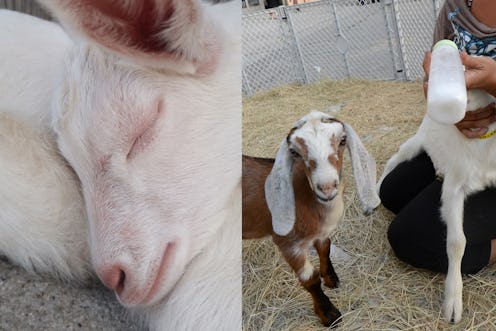Life
Goats Just Want You To Be Happy, According To A New Study

If you’ve ever gazed deeply into the terrifying horizontal slits of a goat’s eyes and thought, Gee, I wonder if this creature can interpret human emotions, then you’re in luck. A team of scientists at Queen Mary University of London found that goats are capable of distinguishing between human facial expressions, and actually prefer interacting with smiling human faces, AKA goats really just want you to be happy. This may well be the most heartwarming goat science news of 2018.
In the recent study, published in Royal Society Open Science, 20 goats from Buttercups Sanctuary for Goats were tested with two images of an unfamiliar human — one with a happy expression and one with an angry expression. The pictures were attached to a wall in an arena, and the goats were released during trials to see how they’d engage with the images. Goats tended to have greater interaction with the happy images, regardless of the human’s gender in the picture or the goat’s gender. The goats were even more entranced by happy faces when the pictures were positioned on the right side of the arena, suggesting that goats analyze positive interactions in the left hemisphere of their brains, the study notes. Natalia Albuquerque, study author and ethologist at the University of São Paulo, told Gizmodo that the study results suggest goats are far “more complex animals than we thought.”
It’s the first evidence that goats can exhibit what the researchers described as a sensitivity to human facial emotional cues. There’s been considerably more research about the relationships between humans and animals like dogs and horses, which have a long history of being kept as pets and companions.
It turns out there’s a slew of interesting goat science out there. “Cyclops” goats exist, with a video of a one-eyed goat in India born with a rare condition called cyclopia going viral. Baby Pygmy goats are capable of developing “accents" as they grow older, with researchers discovering that when the kid goats mixed in social groups, they modified their calls to become more similar to their social surrounding, developing “accents” of sorts. This puts them among the ranks of humans, whales, and bats as fellow mammals known to adapt their vocal sounds in response to their environment.
So what does this mean for the goats? Well, the study raises questions about the ability of animals that aren’t traditionally pet-friendly to perceive human emotions, and further research in the area is needed.
Simply put, goats just might be closer to man’s best friend than we think. Another study from 2016, also from Queen Mary University of London, found that when it comes to problem-solving, goats exhibit dog-like behavior, looking to humans when they are struggling to complete a task.
"We already knew that goats are very attuned to human body language, but we did not know how they react to different human emotional expressions, such as anger and happiness,” said Dr. Christian Nawroth, one of the study’s researchers and a notable goat scientist, in a statement. “Here, we show for the first time that goats do not only distinguish between these expressions, but they also prefer to interact with happy ones."
So the next time you find yourself at a petting zoo or on a farm, make sure to smile at the goats — turns out, it might make a difference.